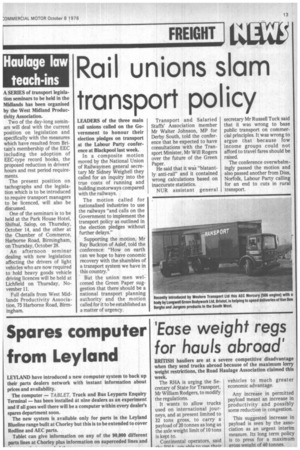Rail unions slam transport policy
Page 15

If you've noticed an error in this article please click here to report it so we can fix it.
LEADERS of the three main rail unions called on the Government to honour their election pledges on transport at the Labour Party conference at Blackpool last week.
In a composite motion moved by the National Union of Railwaymen general secretary Mr Sidney Weighell they called for an inquiry into the true costs of running and building motorways compared with the railways.
The motion called for nationalised industries to use the railways "and calls on the Government to implement the transport policy as outlined in the election pledges without further delays."
Supporting the motion, Mr Ray Buckton of Aslef, told the conference: "How on earth can we hope to have conomic recovery with the shambles of a transport system we have in this country."
But the union men welcomed the Green Paper suggestion that there should be a national transport planning authority and the motion called for it to be established as a matter of urgency. Transport and Salaried Staffs' Association member Mr Walter Johnson, MP for Derby South, told the conference that he expected to have consultations with the Transport Minister, Mr Will Rogers over the future of the Green Paper.
He said that it was "blatantly anti-rail" and it contained wrong calculations based on inaccurate statistics.
NUR assistant general secretary Mr Russell Tuck said that it was wrong to base public transport on commercial principles. It was wrong to argue that because tow income groups could not afford to travel fares should be raised.
The conference overwhelmingly passed the motion and also passed another from Diss, Norfolk, Labour Party calling for an end to cuts in rural transport.




















































































